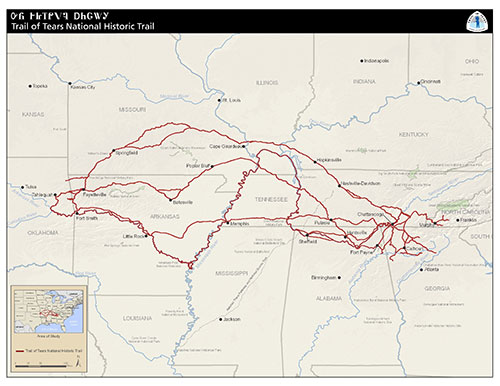
TRAIL OF TEARS DEFACED BY FOREST SERVICEAgency Apologizes for Destroying Sacred Sites but Offers No Atonement
September 20, 2016
The Trail of Tears was a series of forced relocations of Indian tribes from the Southeast U.S. following the Indian Removal Act of 1830, during which thousands died. The series of protected trails cover 2,200 miles stretching across nine states, from Georgia to Oklahoma. In March 2014, Cherokee National Forest officials launched extensive erosion control work but did so –
“This is one the most blatant official desecrations of a sacred site in modern American history,” stated PEER Executive Director Jeff Ruch, noting that on September 6, 2016, Tennessee’s State Historical Commission cancelled its recognition of the reliability of the Cherokee National Forest’s cultural preservation program, thus requiring detailed state review of all future projects. “Jaw-dropping incompetence mixed with abject dereliction of duty coated in an impenetrable mantle of bureaucratic self-preservation spawned this debacle.” Trail of Tears map Shortly after the project, the responsible district ranger was promoted to a position in the forest supervisor’s office, placed in charge of “strategic planning” and retired the next year, according to an agency timeline. After the magnitude of the damage was recognized, the Forest Service did only an internal review but did not question anyone under oath or take any apparent disciplinary action. It was not until many months after the damage was known that Regional Forester Tony Tooke issued an apology to the tribes in June which read, in part: “The Forest Service’s actions damaged the Trail of Tears… historic trails that you have told us are sacred to your tribes. Many of you have told me about the great harm this has done to the tribes, emotionally and spiritually. On behalf of the U.S. Forest Service, I sincerely apologize to each and every member of your respective tribes and to each of you individually for this incident.” In a complaint filed yesterday with the Secretary of Agriculture and the USDA Office of Inspector General, PEER is requesting that investigators independent of the Forest Service conduct a thorough review, identify responsible parties and pursue appropriate corrective actions. “This sorry episode shows a Forest Service leadership allergic to any notion of accountability,” added Ruch. “Beyond repairing the damage, the U.S. Forest Service should adopt management reforms which prevent – in an enforceable manner – this type of massive screw-up from ever taking place again.”
On the Web:
Editing by Mary Kauffman, SitNews
Source of News:
Representations of fact and opinions in comments posted are solely those of the individual posters and do not represent the opinions of Sitnews.
|
||
